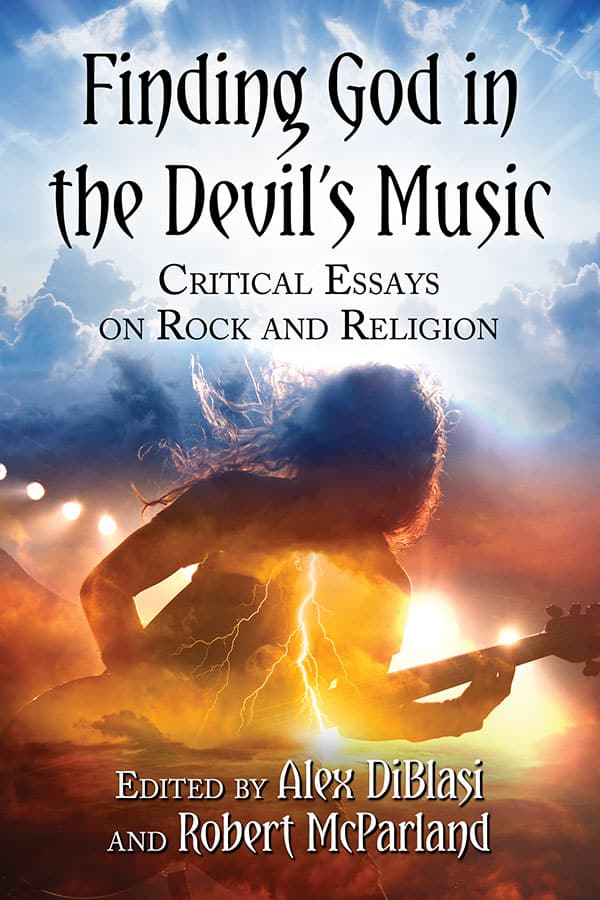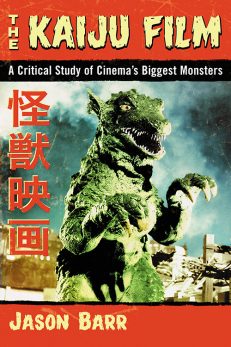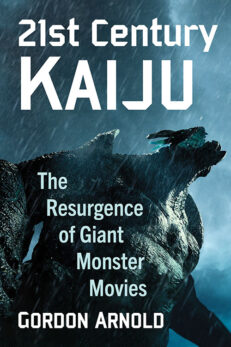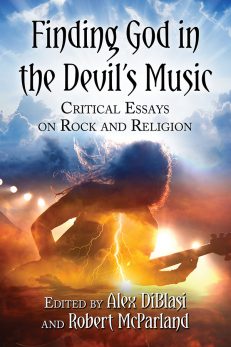Finding God in the Devil’s Music
Critical Essays on Rock and Religion
$19.99
In stock
About the Book
From the rise of the American Evangelical movement to the introduction of Eastern philosophies in the West, the past century has seen major changes in the religious makeup of Western culture. As one result, musicians across the world have brought both “new” and old religious beliefs into their works. This book investigates Rock music as an expression of religious inquiry and religious devotion. Contributors to this essay collection use a variety of sources, including artist biographies, record and concert reviews, videos, personal experience, rock music forums and social media in order to investigate the relationship of Rock music and religion from a number of perspectives. The essays also explore public interest in religion as a platform for expression and social critique, viewing this issue through the lens of popular Rock music.
About the Author(s)
Alex DiBlasi is a writer, educator, and musician. He has written on Frank Zappa, The Kinks, The Monkees, and numerous film, music, theatrical and dining reviews. He lives in Portland, Oregon.
Robert McParland is a professor of English at Felician University in Rutherford, New Jersey. His popular music writings include publications on The Beatles, The Who, U2, Bruce Springsteen, John Fogerty, Paul Simon, and American lyricists.
Bibliographic Details
Edited by Alex DiBlasi and Robert McParland
Format: softcover (6 x 9)
Pages: 197
Bibliographic Info: appendix, notes, bibliographies, index
Copyright Date: 2019
pISBN: 978-1-4766-7150-5
eISBN: 978-1-4766-3394-7
Imprint: McFarland
Table of Contents
Preface 1
Introduction 3
The Religious Rock Meditations of Black Sabbath (Candace Ursala Grissom) 7
Faith in Something Bigger: Pete Townshend, Meher Baba and Tommy (Alex DiBlasi) 17
Heavy Metal as Religion: Rhetorically Repurposing Catholic Motifs Within Power Metal (Gavin F. Hurley) 51
Christ from Chaos: Redemption Through Rebellion in Christian Hardcore (Karen Fournier) 62
Religious Aesthetics of Nine Inch Nails: Negative Theology as Mediation of Transcendence (James E. Willis III) 74
Duncan Sheik’s Human Revolution in Sound/Buddhist Search for the Perfect Sound (Erika M. Nelson Mukherjee) 84
Criticism and Confusion in the Spiritual Transformation of Matisyahu (Erin E. Bauer) 105
Tracing a Dis/Harmony of the Spheres (Sabatino DiBernardo) 117
Mystical Rock and Visionary Sounds: From the Sacramental Instructions of The Psychedelic Experience to Religious Ecstasy
in The Beatles’ “Tomorrow Never Knows” (Morgan Shipley) 134
Into the Slipstream: An Inquiry Concerning Inspiration and Creativity (Robert McParland) 151
Appendix: Discography of Works Discussed (by artist) 179
About the Contributors 183
Index 185
Author Interview
 Review Fix chats with Alex DiBlasi, who discusses his new book, Finding God in the Devil’s Music: Critical Essays on Rock and Religion. Discussing the importance of metal music and its connection to Christianity, DiBlasi sheds some like on the controversial, but interesting topic.
Review Fix chats with Alex DiBlasi, who discusses his new book, Finding God in the Devil’s Music: Critical Essays on Rock and Religion. Discussing the importance of metal music and its connection to Christianity, DiBlasi sheds some like on the controversial, but interesting topic.
Review Fix: What inspired this book?
Alex DiBlasi: This goes way back for me, but in 2011 I came across Pete Townshend’s solo album Who Came First. It’s all songs inspired by his guru, this interfaith mystic named Meher Baba. On it is a song called “Pure and Easy,” which contains allusions to God, but also identifies music as our best means to connect with that entity. In the past I’d studied Sikh theology, which greatly emphasizes music. Their sacred text, the Guru Granth Sahib, is meant to be sung, and there’s this idea throughout world religious traditions of using sound vibrations to achieve a higher consciousness. Singing and chanting is central in many religions, especially mystical practices such as meditation. Townshend has spoken about the sharply acute state of consciousness he achieves on stage. Neuro researchers have also done studies where they’ve found the same parts of the brain used during meditation are similarly active while playing music.
Meher Baba’s teachings are wonderful. He believed love was in increasingly short supply across the world, and that the best remedy for society’s ills is for people to act, live, and serve in a spirit of love. Townshend became enamored by Baba in 1967, the year of the Summer of Love and Monterey Pop. Baba’s writing on God intoxication (a Sufi concept with roots in Vedic traditions) inspired him to quit all drugs, even pot, for over a decade. More importantly, these new ideas would inform Townshend’s songwriting in a huge way. It set him apart from his peers. Aside from George Harrison, no other British songwriter from that period would so openly explore and extoll spiritualism in their music.
All of this inspired me to organize a panel on Popular Music and Religion at the Popular Culture Association’s national conference in 2014. I ended up getting two panels to happen, which was great! Near the end of the conference, Robert McParland, who had presented on one of the Music and Religion panels, approached me about working together on an edited collection. We put together a call for papers, really took our time with it to make sure we received thoughtful work from scholars in both music and religious studies, and I’m very proud of what we’ve put together.
Review Fix: What was the initial goal of the book?
DiBlasi: We set out to create the first book of its kind: a collection of essays on a variety of musicians who sought inspiration from a variety of religious/spiritual teachings. Religious music is largely the history of music itself. There’s standalone volumes like The Gospel According to The Beatles and plenty out there on Dylan and religion, but it’s a topic worthy of more in-depth study. What we ended up with was even better in that it speaks to the innate oneness of belief itself.
Review Fix: How important is the impact of a band like Stryper on the metal scene?
DiBlasi: Thank you for asking this. I was subjected to Stryper when I was a kid, the album was called To Hell With the Devil. I can’t be the first person to say this about them, but even then, despite my youthful impressionability, I thought they were silly.
To answer your question, the band was an attempt to cash in on the shocking Satanic imagery of contemporary metal while pretending to be against it. Look at the cover of To Hell With The Devil: there’s still a pentagram peeping out from under the logo! Their founder Michael Sweet still refers to televangelist, alleged rapist, convicted fraud, and album “thank you” recipient Jim Bakker as “a great guy.” That should say a lot about their brand of Christianity.
Unfortunately, the band is still around. If their sincerity was still in question, just take a look at their latest album, which bears an intentionally provocative piece of blasphemy as its title. Sweet sent out a Tweet just yesterday gloating about how their song “Honestly” took them from gold to platinum status, not how its lyrics of faith have brought people to the Lord. Only in it for the money. (https://twitter.com/michaelhsweet/status/1034295982211690496)
Review Fix: Why does metal still matter?
DiBlasi: All music is a valid representation of some facet of the human experience. There is a lot of sociology in these genres that double as subcultures. Metal is certainly a glimpse into a culture that is the realm of the young, the disenfranchised, and the desperate. For that, it’s great. It has its shortcomings, there is a lot of sexism and I’ve sat through presentations that examine the role of Satanic and even Nazi imagery in metal, and those are indefensible. I’ve never been too keen on labels, being a musician myself I’ve long embraced Frank Zappa’s ethos that music is either good or bad and that genre labels are only so much marketing. Sometimes the difference is how loud the amps are.
Review Fix: What was it like to work with Robert McParland?
DiBlasi: I was excited for the opportunity to work with Robert. We have a lot of mutual friends through the Popular Culture Association and had both been admirers of each other’s writing. In the early stages of developing the idea for the book, we made a real connection talking about our shared knowledge of Vedic literature.
Review Fix: What was the research process like?
DiBlasi: Research for work like this is always a thrill. I get to study and examine the creative process and listen to great music while I do it.
Review Fix: How did you pick your contributors?
DiBlasi: We wanted a diverse range of topics within the general “religion and popular music” umbrella.
Review Fix: Any plans on continuing your research?
DiBlasi: Yes. In this book, I focus on Meher Baba’s influence on The Who’s rock opera Tommy, but that was merely the start of a 12-year period in Townshend’s career where he explored spiritual themes. There is more to be written on that specific subject. Generally, I’ve gotten more serious about my faith and want to continue integrating it with my interest in music, culture, and society.
Review Fix: What was the biggest thing you learned over the course of putting this book together?
DiBlasi: This was my second book project, so I felt a lot more comfortable knowing what to look for in terms of contributions and in selecting contributors. I would say the biggest thing I learned – is that there is a decidedly woke philosophy in the best music from that protest era in the late 1960s into the 1970s that one could cobble together and call it a religion. It’s at the point where I would go so far as to call some of these songwriters prophets and seers.
Review Fix: Who do you think will enjoy this book the most?
DiBlasi: This book is for people into music, but also interested in religious studies or spirituality.
Review Fix: How do you want this book to be remembered?
DiBlasi: As a valuable contribution – since I think this is the first book of its kind, possibly even a starting point – for an ongoing dialog to be had exploring the intersection of these two fascinating subjects.
Review Fix: What’s next?
DiBlasi: I want to write a book on Frank Zappa. It’s been a dream of mine since college and I’m ready for it.
Review Fix: Anything else you’d like to add?
DiBlasi: I want to find a publisher interested in a book on Frank Zappa.





